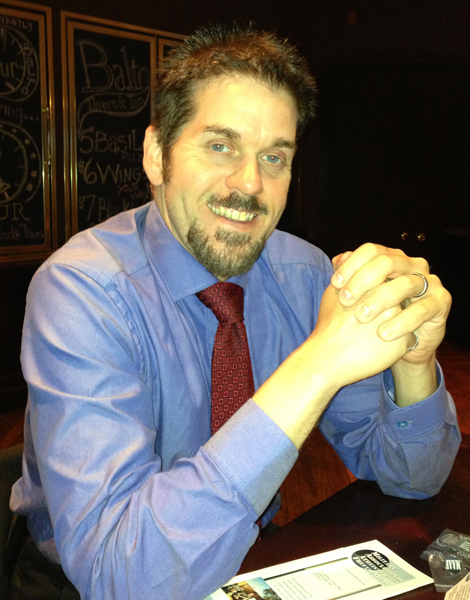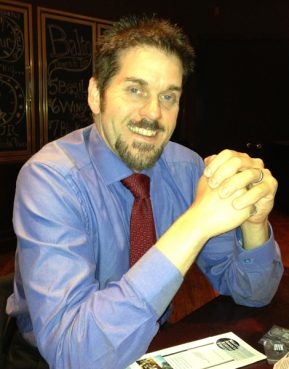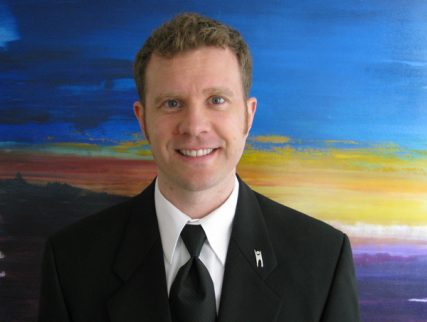(RNS) If Jason Heap has his way, he’ll trade his Oxford tweeds for the crisp whites of a newly minted U.S. Navy chaplain.
“This is my chance to give back to my country,” said Heap, 38. “I want to use my skills on behalf of our people in the service. Hopefully, the Navy will see where I can be useful.”
But Heap’s goal is not assured. He fits the requirements— with master’s degrees from both Brite Divinity School and Oxford University. His paperwork is complete. He passed the physical tests and has been interviewed by a Navy chaplain. The only thing he does not have is an endorsement from a religious organization approved by the Navy.
And there’s the rub: Heap is a Humanist. He carries the endorsement of the Humanist Society, an organization of those who believe in the positive power of human potential, but not necessarily in God. The Humanist Society — like all organizations that represent nonbelievers — is not among the Department of Defense’s list of approximately 200 groups allowed to endorse chaplains.
“The military includes atheists, humanists and people with nontheistic perspectives and the military currently has no way to service them,” said Jason Torpy, president of the Military Association of Atheists and Freethinkers, a group supporting Heap.
Asked why there are no nonbelievers in the chaplaincy, Lt. Cmdr. Nate Christensen, a Department of Defense spokesman, responded by email: “The department does not endorse religion or any one religion or religious organization, and provides to the maximum extent possible for the free exercise of religion by all members of the military services who choose to do so.”
According to current government figures, the U.S. military has 1.4 million active duty servicemen and women in the Army, Navy, Air Force and Marines. About 2,800 active duty chaplains serve them; the vast majority of them Christian.
There are an estimated 13,000 active duty servicemen and women that identify as atheists or agnostics — more than the number of Muslims, Buddhists and Hindus combined — all of which have their own chaplains. Add to that a significant number — more than 276,000 — who say they have “no religious preference.”
The ranks of the nonreligious are likely to grow. Last year’s study by the Pew Forum on Religion and Public Life found one-third of Americans under 30 — those most likely to enter the military — have no religious affiliation.
Heap and his supporters say the push for a military Humanist chaplain goes beyond the desire for recognition. They note that when soldiers seek mental health counseling it is noted in their record and reported up the chain of command. But consultations with chaplains are confidential, making them a safe place to discuss the problems soldiers routinely face — loneliness, fear, anxiety and other personal issues.
Heap is not the only candidate for the first Humanist chaplain in the military. There are three more, two of whom are already serving as military chaplains with endorsements from Christian groups. They asked to remain anonymous for fear of losing their endorsements, and therefore their jobs. That fear is real. An Army chaplain who sought to change his endorsement from Pentecostal to Wiccan — another unapproved group — in 2007 lost his position.
“Chaplain Mitch,” a military chaplain since the mid-2000s, would not give his full name. He is endorsed by a Christian organization, but he’s come to identify as a Humanist and would change endorsements, if permitted — something he feels would have very little effect on how he fulfills his duties.
“My whole being as a chaplain is to serve the needs of the soldiers and to ensure that, religious or not, what they need is provided for,” he said. “But allowing Humanist chaplains would validate the life system and the ethics of thousands of soldiers who already identify as nonreligious and feel themselves patriotic individuals.”
Still, there is resistance to the idea of nonreligious military chaplains. In June, two U.S. congressmen proposed an amendment to a bill calling for the appointment of military chaplains from nontheistic organizations, including Humanist ones. An uproar ensued and the amendment was defeated.
Humanist chaplaincies outside the military are gaining acceptance. Several U.S. universities, including Harvard and Stanford, have full-time Humanist chaplains, and more hospitals are including them in their ranks. There are Humanist military chaplains in the Netherlands and Belgium.
Kurt Fredrickson, a professor at Fuller Theological Seminary who oversees a military chaplain training program, wonders what Humanist chaplains can offer that existing chaplains cannot. But Fredrickson recognizes that the spiritual makeup of the country — and its military — is changing.
“In the end, chaplains are very important, and if Humanist chaplains meet a need for our military, this concept must be embraced,” he said.
Meanwhile, Heap is awaiting word from chaplaincy and recruiting leadership reviewing his application. Spokesman Christensen at the Department of Defense said he could not comment on anyone’s application.
Torpy, of the Military Association of Atheists and Freethinkers, has long been an advocate for reform in the chaplaincy. In 2011 he met with each of the chiefs of chaplains offices, he said, and has also had ongoing conversations with other chaplains at different levels.
“There is a need and there is capability,” said Torpy. “And right now the chaplaincy is not doing their duty to these service members.”







